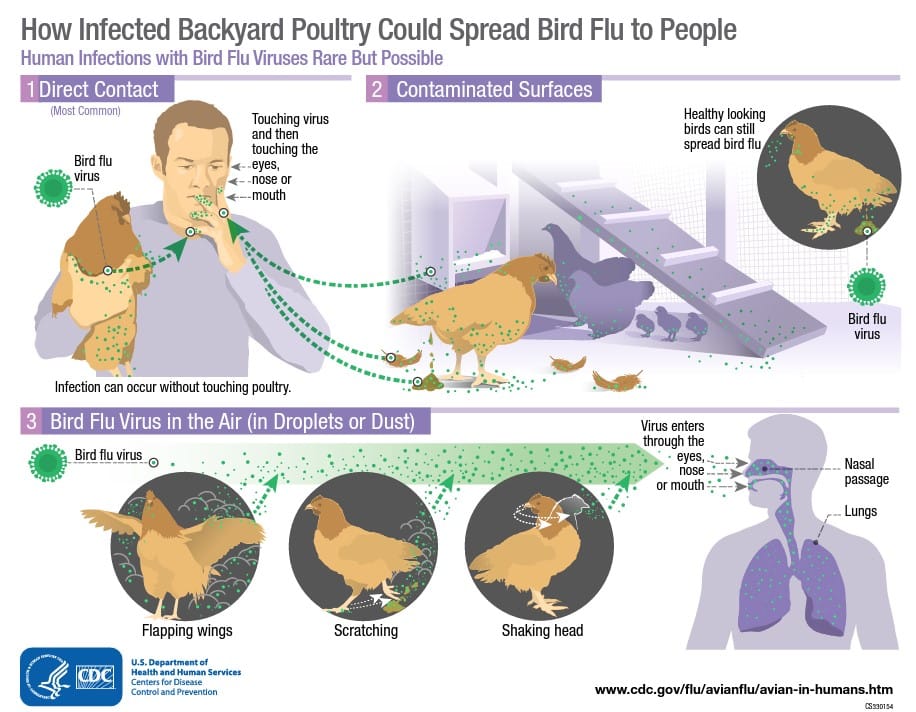The U.S. Department of Agriculture’s (USDA) Animal and Plant Health Inspection Service (APHIS) has stepped up its surveillance efforts in California after detecting avian influenza in migratory birds. The increased surveillance is aimed at preventing the spread of the virus to commercial poultry farms and minimizing potential economic losses.
Avian influenza, also known as bird flu, is a highly contagious and potentially deadly virus that affects birds. The virus can be spread through direct contact with infected birds, contaminated feed and water, and even through the air. While the virus is not typically transmitted to humans, it can have significant economic impacts on the poultry industry.
The detection of avian influenza in migratory birds in California has raised concerns among farmers, animal health experts, and wildlife enthusiasts. Migratory birds, such as ducks, geese, and shorebirds, can carry the virus and transmit it to domestic birds. The USDA’s increased surveillance efforts are focused on detecting the virus early, so that prompt action can be taken to prevent its spread.
“We take the detection of avian influenza very seriously,” said a spokesperson for the USDA. “Our goal is to detect the virus early, so that we can take prompt action to prevent its spread and minimize potential economic losses.”
The USDA’s surveillance efforts include testing wild birds, monitoring poultry farms, and working with state and local authorities to respond quickly to any suspected cases of avian influenza. The agency is also providing guidance to farmers and bird owners on how to protect their flocks from the virus.
California is a major producer of poultry products, with the state’s poultry industry valued at over $3 billion annually. The detection of avian influenza in migratory birds has raised concerns among farmers, who are taking steps to protect their flocks.
“We’re taking this very seriously,” said a spokesperson for the California Poultry Association. “We’re working closely with the USDA and state authorities to ensure that our farms are taking all necessary precautions to prevent the spread of the virus.”
The detection of avian influenza in migratory birds is not unique to California. The virus has been detected in wild birds in several other states, including Oregon, Washington, and Idaho. However, the USDA’s increased surveillance efforts in California reflect the state’s importance to the poultry industry.
Avian influenza is a significant concern for the poultry industry, as it can have major economic impacts. In 2014-2015, an outbreak of avian influenza in the United States resulted in the deaths of over 50 million birds and cost the industry an estimated $3.3 billion.
The USDA’s increased surveillance efforts in California are part of a larger effort to prevent the spread of avian influenza and protect the poultry industry. The agency is working closely with state and local authorities, as well as farmers and bird owners, to ensure that all necessary precautions are being taken.
In addition to its surveillance efforts, the USDA is also providing guidance to farmers and bird owners on how to protect their flocks from avian influenza. This includes guidance on biosecurity measures, such as keeping birds indoors, using netting to cover feed and water, and restricting access to farms.
The USDA is also working with state and local authorities to develop response plans in the event of an avian influenza outbreak. These plans include protocols for detecting and responding to suspected cases of avian influenza, as well as strategies for containing and eradicating the virus.
The detection of avian influenza in migratory birds in California has raised concerns among wildlife enthusiasts, who are urging the public to take precautions to prevent the spread of the virus. This includes avoiding contact with wild birds, washing hands thoroughly after handling birds or bird feeders, and reporting any sick or dead birds to the authorities.
“Avian influenza is a significant concern for wildlife enthusiasts,” said a spokesperson for the Audubon Society. “We’re urging the public to take precautions to prevent the spread of the virus and to report any sick or dead birds to the authorities.”
The USDA’s increased surveillance efforts in California are part of a larger effort to protect the poultry industry and prevent the spread of avian influenza. The agency is working closely with state and local authorities, farmers, and bird owners to ensure that all necessary precautions are being taken.
In conclusion, the detection of avian influenza in migratory birds in California has raised concerns among farmers, animal health experts, and wildlife enthusiasts. The USDA’s increased surveillance efforts are aimed at preventing the spread of the virus to commercial poultry farms and minimizing potential economic losses. The agency is working closely with state and local authorities, farmers, and bird owners to ensure that all necessary precautions are being taken.



